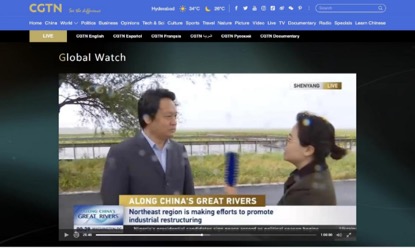
On October 3rd, Prof. Yang Zhi’an from School of Economics of LNU received a special interview from China Global Television Network (CGTN) Global Watch on the achievements, challenges and countermeasures of the all-round revitalization of northeast China in the new era.
In the interview, Prof. Yang Zhi’an first described the achievements of the revitalization of Northeast China. Firstly, the economic development of the northeast is stable and promising. Through the promotion of reform, in the year 2019, the Gross Regional Product of Liaoning, Jilin and Heilongjiang Provinces had a relatively rapid growth on year-on-year basis, and the endogenous power of northeastern region’s economy was constantly enhanced. Secondly, new progress has been made in promoting industrial restructuring. The development of strategic emerging industries and high-tech industries accelerated. Thirdly, the business environment continued to improve. Liaoning Province took the lead in China to issue the Regulations on Optimizing the Business Environment. Heilongjiang Province and Jilin Province also launched a series of measures to improve the business environment, which further optimized the business environment of the northeastern part of China. Fourthly, regional coordinated development has been building up. Northeast China’s trade with the Yangtze River Delta and Beijing-Tianjin-Hebei region has maintained a steady growth, and its trade with the Pearl River Delta and Chengdu-Chongqing Economic Zone has grown rapidly.
What challenges will the northeast face in the future? What countermeasures should be taken? Prof. Yang Zhi’an answered: Firstly, we should solve the deep-seated contradictions of the system and mechanism of revitalizing the northeast. We should fundamentally provide institutional guarantees for economic development through the reform of institution and mechanism. Secondly, we should focus on solving the problem of lack of innovation. The revitalization of Northeast China must take the road of independent innovation and promote deep integration of the Internet, big data, artificial intelligence and manufacturing. Thirdly, the business environment needs to be further optimized. We should strive to build an amiable and clear relationship between the government and enterprises, and a clean and upright social atmosphere. Fourthly, we should strengthen the vitality of state-owned economy. We should further deepen the overall reform of state-owned enterprises from the perspective of national strategy. Fifthly, we should build a mechanism to defuse and prevent economic risks in the revitalization of the northeast. The scale of new debts of local governments should be strictly controlled. We should continue to provide policy support to resource-exhausted cities and formulate a three-tier risk prevention mechanism at the provincial, municipal and large enterprises levels.